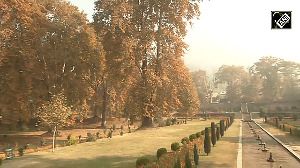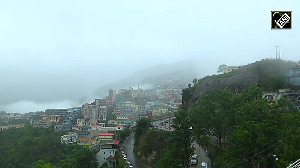Not only did he offer to resign but he also told Bhattacharya that 'defence matters decided by the Centre can't be overruled by the states.' Dr Singh also gave the West Bengal CM the example of Kerala where Indo-China joint military exercises were conducted unhindered. According to a source in New Delhi, "The PM said no state can deny defence exercises." Dr Singh also issued a stern warning that the Centre can impose President's rule if a state does not cooperate in the country's defence matters.
He made these remarks during a telephone conversation with Bhattacharya, which took place before the exercise.
"The prime minister shows guts when a major issue related to America comes up," a senior government official in New Delhi said.
After his conversation with Bhattacharya, the Cabinet Committee on Security met and passed a resolution that states have to cooperate on defence matters.
The impact of Singh's strong stand was so intense that Prakash Karat, general secretary of the Communist Party of India-Marxist, met the prime minister the next morning and promised all-out cooperation for the Indo-US joint exercise.
Belying his soft exterior, Prime Minister Singh can turn into a man of steel even against his allies if he feels their policies or actions could threaten the national interest and prestige.
In this case, what angered him was that his commitment and belief to take the US on board in his strategic vision for India was being obstructed by the CPI-M, which rules West Bengal. That state's Marxist activists threatened to launch a massive agitation against the defence exercise.
India and the US conducted the six-day joint air exercise on November 7 at the Kalaikunda air force station in West Midnapore district.
But that was made possible only after Dr Singh handled the situation firmly, to the surprise of his colleagues.
Very few people in government know the prime minister had offered to resign, but only after sending a message that in India's federal structure, a commitment given by the Centre is binding on the states.
The schedule for the exercise had been drawn up by the military officers of the two countries in pursuance of the agreement for bilateral strategic cooperation reached during the earlier National Democratic Alliance government.
Joint exercises in pursuance of this agreement had been held before in other parts of India to the mutual benefit of the two countries.
When it was West Bengal's turn to conduct the exercise, the state CPI-M mounted an agitation and threatened to oppose the defence initiative through mass mobilisation of party workers, thereby creating fears about the smooth conduct of the exercise and the physical security of the visiting American officers and troops.
When Bhattacharya, toeing the state CPI-M line, also started sending out negative signals, Dr Singh called up the chief minister.
Instead of shifting the venue outside West Bengal, the prime minister put his foot down and insisted that the state government ensure there was no obstruction to the exercise because it has a bearing on national prestige.
Bhattacharya was not given any option but to concede Dr Singh's demand.
The prime minister's polite, but stern, message and his reminder to the chief minister of the latter's obligations under the Constitution was a historical political move which went unnoticed.
Following this, Bhattacharya asked the state police to take firm security measures for the exercise.
The West Midnapore district Left Front, however, went ahead with its protests.
An effigy of US President George W Bush and a copy of the India-US defense framework were burnt. Local Left leaders made speeches showing an Indian map with chains around it.
But the joint military exercise went ahead and was reported a success.





